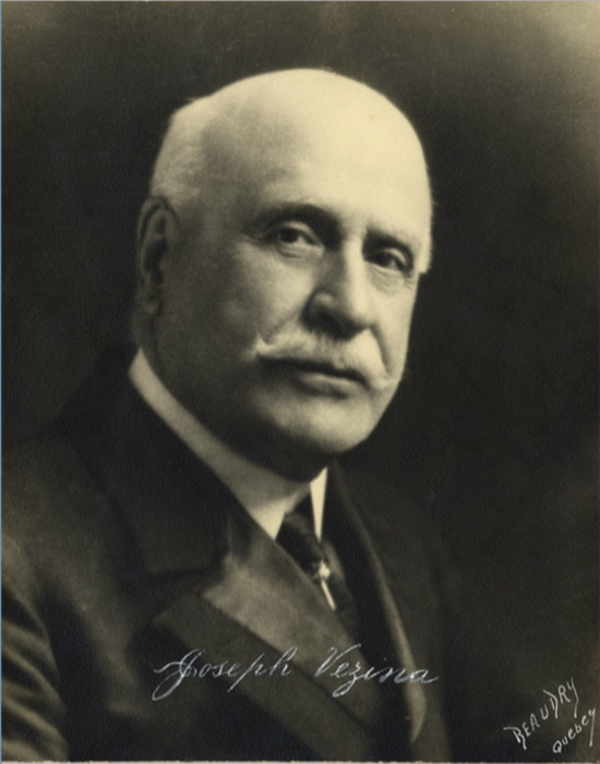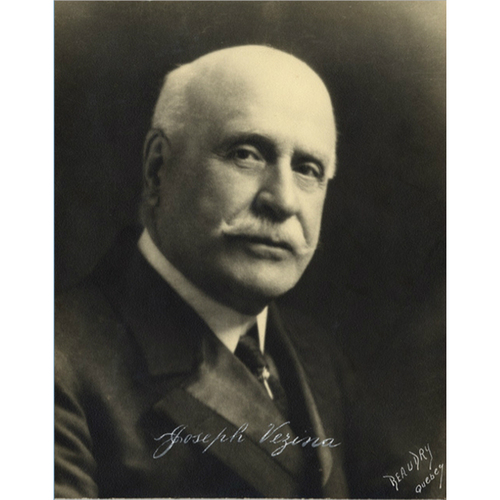
Source: Courtesy of Wikimedia Commons
VÉZINA, JOSEPH (baptized François-Joseph), bandmaster and conductor, professor, organist, and composer; b. 11 June 1849 at Quebec, son of François Vézina, a house painter, and Marie Petitclerc; m. there 24 Sept. 1872 Monique Tardiff, and they had four sons and three daughters; d. there 5 Oct. 1924 and was buried 8 October in Notre-Dame de Belmont cemetery at Sainte-Foy, Que.
Joseph Vézina was given some music lessons by his father, an amateur musician who taught him to play the baritone and the piano, as well as other instruments. He also received six months of instruction in harmony from Calixa Lavallée*. For the rest, Vézina was self-taught. In 1866, at the age of 17, he left the Petit Séminaire de Québec, where he had been a student since 1861, and signed on as a cabin boy on a boat that took him to Europe. During the voyage he felt so painfully homesick that he decided to spend the rest of his life in Quebec City as a professional musician, despite the inherent difficulties in pursuing such a career in the provincial capital.
It was Quebec City’s various military ensembles that gave Vézina his first suitable opportunities. In 1866 he enrolled in the School of Military Instruction. The following year he joined the 9th Battalion Volunteer Militia Rifles, playing the baritone in the regimental band, and he would serve as its bandmaster from 1868 to 1879. Over the years he would lead a great many bands; in particular, he founded Notre-Dame de Beauport’s in 1874 and those of Montmorency (Beauport) and Charlesbourg in 1875. In addition, he gave lessons in various wind instruments. With a very good ear, an unusual intuitive understanding of music, and a remarkable capacity for work, Vézina brought most of these ensembles to a high level of performance. In 1878, for example, the Notre-Dame de Beauport one took first prize in a competition held at the Victoria Skating Rink in Montreal in which musicians from all across Canada took part. In 1879 Vézina was appointed bandmaster of the Garrison Artillery’s B Battery band (which in 1922 became that of the Royal 22nd Regiment). He gave up this position to lead the Saint-Jean-Baptiste de Québec cadet band in 1912.
It was in 1880, during celebrations on Saint-Jean-Baptiste day at the Pavillon des Patineurs in Quebec City, that Vézina conducted the first performance of “O Canada” (with words by Adolphe-Basile Routhier* and music by Calixa Lavallée), which a century later would be chosen officially as the country’s national anthem. In the same year he was made a professor of music at the Petit Séminaire de Québec.
Vézina became a member of the Académie de Musique de Québec in 1887 and he would serve as its president in 1914–15. In this period his abilities reportedly were recognized by many leading musical figures of the day, including Carlo Alberto Cappa and Walter Damrosch, both of New York, who are believed to have urged him to move to the United States. But Vézina always refused to leave his native city. The following years were marked by important events. In 1894 and 1896 he conducted the concerts given at the winter carnival, among which the most important was undoubtedly the one held on 27 Jan. 1896 at the Quebec Drill Hall. At this time Vézina also conducted the ensembles that accompanied the famous singer Emma Albani [Lajeunesse], notably in her performances of Casta diva from Bellini’s opera Norma, and the Inflammatus from Rossini’s Stabat mater. He became organist for the parish of St Patrick in 1896, a post he would leave in 1912. On 16 Sept. 1901 Vézina conducted a gala concert on Dufferin Terrace on the occasion of a visit by the Duke and Duchess of Cornwall. In June 1902, again at the Quebec Drill Hall, he conducted three concerts held to celebrate the 50th anniversary of the founding of the Université Laval.
These concerts met with success and stirred up enthusiasm. Thus Vézina was invited by three young musicians – Louis-Léonidas Dumas, Joseph Talbot, and his own son, Raoul Vézina – to become the first music director of the Orchestre Symphonique de Québec, which was founded on 3 or 5 Oct. 1902. On 23 Feb. 1903 the orchestra hired some 15 new players, most of whom were professionals and members of either the regimental band or the Septuor Haydn. Known henceforth as the Société Symphonique de Québec – a name retained until 25 June 1942 – this orchestra is the oldest in Canada and it was still performing at the beginning of the 21st century. He quickly built it into an ensemble whose excellence gained national recognition. As early as 1907 the orchestra won first prize in the inaugural music and drama competition organized in Ottawa by Lord Grey*, the governor general of Canada. The judge on that occasion, George Whitefield Chadwick, who was one of the most distinguished composers in the United States and director of the New England Conservatory of Music in Boston, declared that he was most favourably impressed by the quality of the Société Symphonique de Québec’s playing. Critics from Ottawa and elsewhere were unanimously full of praise. The following year Vézina was president of the music committee for the city’s tercentennial celebrations, and he conducted several major concerts given by the Société Symphonique de Québec in this connection.
In the course of his 22 years as music director, Vézina led his orchestra to outstanding progress. Until 1914, like the world’s great professional ensembles, the Société Symphonique de Québec, which had some 60 musicians, presented subscription concerts; three were given each year in the Auditorium de Québec, a hall inaugurated by Vézina and his orchestra in 1903 that would later become the Théâtre Capitole. The Société Symphonique de Québec also performed at the annual meetings of the Société du Parler Français au Canada [see Stanislas-Alfred Lortie*], an association that lasted until 1946, as well as at many celebrations of a religious or social nature. The orchestra was, moreover, invited to perform in other parts of the country, notably in Ottawa, Montreal, Sherbrooke, and Montmagny.
In 1922 Vézina became one of the first full professors and one of the earliest doctors of music at the École de Musique of the Université Laval, which opened that year with Gustave Gagnon as director. But his teaching career there would be cut short by his death on 5 Oct. 1924. At the age of 75 he had still been a professor at the Petit Séminaire de Québec and conductor of the Société Symphonique de Québec.
Prior to 1900 Vézina had composed many works for military bands, wind ensembles, and symphony orchestras, pieces for various instruments including piano and flute, songs, and a few choral works. He also did a number of arrangements of other composers’ works. In later years he would create the musical scores for three comic operas first performed by the Société Symphonique de Québec in 1906, 1910, and 1912 respectively: Le lauréat (libretto by Félix-Gabriel Marchand*), Le rajah (libretto by Gaston Morelles, pseudonym of Benjamin Michaud), and Le fétiche (libretto by Alex Villandray and Louis Fleur, pseudonyms of Alexandre Plante and Antonio Langlais). A fourth lyric work, La grosse gerbe, adapted from a poem by Pamphile Le May*, has remained unfinished.
Joseph Vézina was one of the principal forces behind the musical life in the provincial capital for more than half a century. An indefatigable worker, a first-rate organizer, and an exacting, versatile, and undeniably gifted musician, he remains a living presence through his most renowned achievement, the Orchestre Symphonique de Québec, which is now considered one of Canada’s leading orchestras.
There are documents pertaining to Joseph Vézina in several archival collections. The ANQ-Q holds the Fonds Joseph Vézina (P326) and the Fonds Orchestre symphonique de Québec (P519). The Fonds Joseph Vézina at the Conservatoire de Musique de Québec has manuscript copies of his works. At MCQ-FSQ, information about Vézina will be found in the Journal du séminaire (MS 34) and the Journal du conseil des plumitifs (MS 13) as well as in the series SME 9, which contains some of the subject’s letters; also worth consulting is an unclassified musical fonds, which contains scores written by Joseph and his son Raoul.
ANQ-Q, CE301-S1, 4 août 1835, 12 juin 1849, 24 sept. 1872. Le Devoir, 6 oct. 1924. Nicole Brown, “Joseph Vézina (1849–1924), vie, œuvre et catalogue” (mémoire de ma, Conservatoire de Musique de Québec, 1994). Vivianne Émond, “‘Musique et musiciens à Québec: souvenirs d’un amateur’ de Nazaire Le Vasseur (1848–1927): étude critique” (mémoire de m.mus., univ. Laval, Québec, 1986). Encyclopedia of music in Canada (Kallmann et al.), 1366–67. Bertrand Guay, Un siècle de symphonie à Québec: l’Orchestre symphonique de Québec, 1902–2002 (Québec, 2002). Odile Magnan, “La musique à Québec, 1908–1918: à travers l’Action sociale et l’Action catholique” (mémoire de ma, univ. Laval, 1980).
Cite This Article
Bertrand Guay, “VÉZINA, JOSEPH (baptized François-Joseph),” in Dictionary of Canadian Biography, vol. 15, University of Toronto/Université Laval, 2003–, accessed March 1, 2026, https://www.biographi.ca/en/bio/vezina_joseph_15E.html.
The citation above shows the format for footnotes and endnotes according to the Chicago manual of style (16th edition). Information to be used in other citation formats:
| Permalink: | https://www.biographi.ca/en/bio/vezina_joseph_15E.html |
| Author of Article: | Bertrand Guay |
| Title of Article: | VÉZINA, JOSEPH (baptized François-Joseph) |
| Publication Name: | Dictionary of Canadian Biography, vol. 15 |
| Publisher: | University of Toronto/Université Laval |
| Year of publication: | 2005 |
| Year of revision: | 2005 |
| Access Date: | March 1, 2026 |



